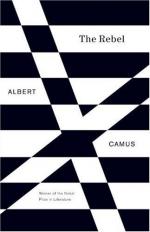
|
| Name: _________________________ | Period: ___________________ |
This test consists of 15 multiple choice questions and 5 short answer questions.
Multiple Choice Questions
1. In Part 3, people who despair about everything can only be provided with faith by what?
(a) Passion.
(b) Money.
(c) Politics.
(d) Reason.
2. What era followed the metaphysical and theological eras?
(a) Communist.
(b) Marxist.
(c) Nihilist.
(d) Positivist.
3. What does Camus think the methods of thought that claim to lead the world into revolution have become in Part 3?
(a) Ideologies of consent.
(b) Ideologies of hatred.
(c) Ideologies of politics.
(d) Ideologies of rebellion.
4. According to Camus in Part 5, what preaches a sermon on charity?
(a) Rebellion.
(b) Virtue.
(c) Reality.
(d) Religion.
5. According to Camus in Part 5, what is the only way a rebel can reconcile himself with committing murder?
(a) Writing an apology.
(b) Going to court.
(c) Accepting his own death.
(d) Murdering again.
6. According to Camus in Part 5, rebellion has become the excuse for a new variety of what?
(a) Artists.
(b) Priests.
(c) Tyrants.
(d) Politicians.
7. Camus says in Part 5 that the blood of murder in ancient times produced what?
(a) Absolute reality.
(b) Religious horror.
(c) Moral conduct.
(d) Artistic rebellion.
8. Fascism is an act of what in Part 3?
(a) Contempt.
(b) Power.
(c) History.
(d) Rebellion.
9. What does Marx believe people have a nostalgia for, according to Part 4?
(a) Childhood.
(b) Beauty.
(c) Art.
(d) Adulthood.
10. If rebellion is cut off from its origins, what does is oscillate between according to Camus in Part 5?
(a) Crime and punishment.
(b) Sacrifice and murder.
(c) Suicide and murder.
(d) Right and wrong.
11. Who does Fascism discover is the "master of death" in Part 3?
(a) Marx.
(b) God.
(c) Hitler.
(d) Satan.
12. In Part 5, Camus states that the extreme of nihilism is when blind and savage murder becomes what?
(a) Honored.
(b) An oasis.
(c) Commonplace.
(d) Expected.
13. According to Part 3, prophecy functions on what type of basis?
(a) Long-term.
(b) Short-term.
(c) Middle-term.
(d) Eternity.
14. According to Camus, suffering at times turns away from too painful expressions of what?
(a) Happiness.
(b) Beauty.
(c) Thought.
(d) Religion.
15. According to Part 3, what does honor lay in?
(a) Obedience.
(b) Religion.
(c) Money.
(d) Power.
Short Answer Questions
1. In Part 3, Camus says revolution is an attempt to conquer what?
2. According to Part 3, what is rebellion's demand?
3. According to Part 4, art realizes the reconciliation of the what with the universal?
4. In Part 3, men of action only believe in action when they are without what?
5. According to Part 3, Russian Communism openly aspires to what?
|
This section contains 369 words (approx. 2 pages at 300 words per page) |

|




